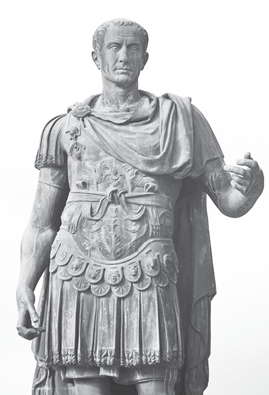“He doth bestride the narrow world like a Colossus,” wrote William Shakespeare of Julius Caesar (100–44 BC). The Roman general and politician was among the most prominent men of his age, as well as a pivotal figure in the history of the West. Caesar conquered Gaul, destroyed the power of the Roman Senate, and laid the foundation for the largest empire of the ancient world.“

Shortly after he was proclaimed dictator for life, however, Caesar was assassinated. It was his adopted son, Octavian (63 BC–AD 14)—later renamed Augustus— who completed Rome’s transformation from republic to empire.
Caesar’s life is among the best documented in the ancient world. He was born into an aristocratic family and joined the army as a teenager. According to a well-known story, while crossing the Aegean Sea he was captured by pirates and held for ransom. Caesar, offended by the low price the pirates demanded, insisted that they raise the ransom before he would agree to be freed.
For the next several decades, Caesar rose steadily in the military and in politics. In 69 BC, he was appointed governor of an Roman province in present-day Spain. He was elected pontifex maximus, the chief religious official in Rome, in 63 BC.
Four years later, in 59 BC, Caesar. He also formed, with two other generals, the First Triumvirate, which in effect controlled the Roman government. The Senate, fearing Caesar’s growing power, ordered him to disband his army in 50 BC.
Caesar’s refusal to obey the Senate—and his famous crossing of the Rubicon River in January 49 BC—triggered a civil war that ended with his victory the next year. The Senate, its power broken, elected him dictator for several consecutive years, and then proclaimed him dictator perpetuo, dictator for life, in 44 BC.
The last step proved too much for Caesar’s critics, who feared that he would reestablish a monarchy and end the Roman Republic. A group of conspirators stabbed him to death on the steps of the Roman forum on March 15—the Ides of March—in 44 BC.
ADDITIONAL FACTS
- Caesar’s family claimed it was descended from Venus, the Roman goddess of love and fertility.
- Regarded as an excellent orator and writer, Caesar wrote two war memoirs, Commentaries on the Gallic Wars and Commentaries on the Civil War, which remain two of the best-known primary sources on that period in Roman history.
- After his death, the name Caesar became a synonym for emperor or military leader. The titles of the monarchs of Germany and Russia—kaiser and czar—were both derived from Caesar’s name.
